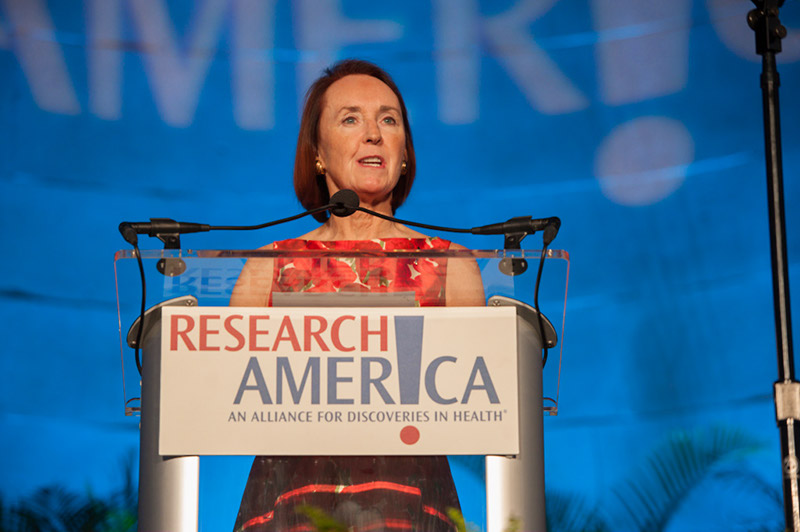Messages Worth Repeating

 Dear Research Advocate:
Dear Research Advocate:
The opioid crisis is responsible for an estimated 1,000 emergency department visits every day in the United States. That is just one of the alarming, and heartbreaking, statistics that has stayed with me since our webinar on the crisis. If you couldn’t join us for it, I promise it is well worth viewing.
The opioid epidemic, as well as the local economic impact of higher education and research and innovation, were prominent themes at a health research forum we co-hosted at Shepherd University in West Virginia on Monday. Shepherd President, Dr. Mary Hendrix, a Research!America board member, welcomed attendees and introduced West Virginia’s senators. Sen. Joe Manchin (D-WV), citing the need for an intensified response to the opioid crisis, noted that employment rates in West Virginia are plummeting due to “addiction, conviction or lack of skill sets.” In describing West Virginia as “ground central” of the opioid crisis, Sen. Shelley Moore Capito (R-WV) challenged the audience to put research and innovation to work against it: “Why shouldn’t our universities be at the leading edge of providing that expertise in research and technology?”
Brad Fenwick, senior vice president of global strategic alliances at Elsevier, the lead sponsor of the program, provided an informative graphic illustrating the scope of the opioid epidemic and trends in research undertaken to address it. The program and a new Research!America-commissioned survey were covered extensively in the media. Reflecting the view from ground central, the survey of West Virginians shows an off-the-charts level of concern about the opioid epidemic and, along with that, very high support for both short- and long-term solutions. At levels far above national survey responses to the same question, West Virginians say that we are not spending enough of our health dollars on medical research. Also at unusually high levels, West Virginians say that the federal government should assign a higher priority to STEM education.
Right now is the moment to assure that the nation will indeed invest more in medical research. My thanks to all who made use of the advocacy tools included in last week’s letter, but we’re not across the finish line yet. In the words of journalist Lawrence Kudlow: “Successful policies are sold by repetition.” Repetition is called for now – if we aren’t successful in getting a bipartisan budget deal that raises the sequestration budget caps, securing favorable funding levels for NIH, NSF, CDC, FDA, AHRQ and other federal research agencies will be a near vertical uphill climb. So please email and tweet your congressional delegation on the need for a bipartisan budget deal. And then repeat in a day or two!
Repeating a message is powerful…as long as the message itself is. When it comes to science advocacy, “I work for you” is a message with impact. Last week, during a visit to the University of Notre Dame (UND), I met with graduate students who live the ethos of public service every day. They are part of a network of student-initiated and led groups determined to build a strong bench of scientists committed to public engagement and advocacy.
Not only was it wonderful to discover these programs at UND, but in following up I heard from a student who had been with her family over the weekend and tried that new approach of saying “I work for you” in conversation with a skeptical, fiscally conservative relative. For the first time, she felt as though she had made a meaningful connection about her work, how it is paid for, and what she is committed to accomplishing in the public’s interest. Now that’s powerful!
Our next Research!America alliance members meeting/call is on Friday, October 27, 2017 from 2:00–3:00 PM EST. Budget specialist Maya MacGuineas, president of the Committee for a Responsible Budget, and Paul Kim, partner at Foley Hoag LLP and expert on all things “Bayh-Dole Act” (with its implications for IP and tech transfer), will be joining the discussion. RSVP to Jacqueline Lagoy ([email protected]).
Sincerely,
Mary Woolley




